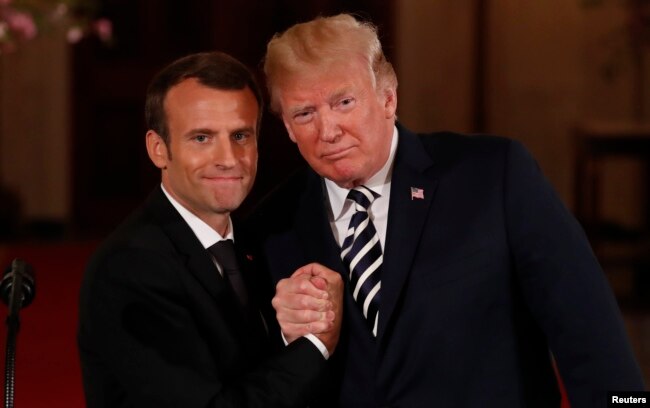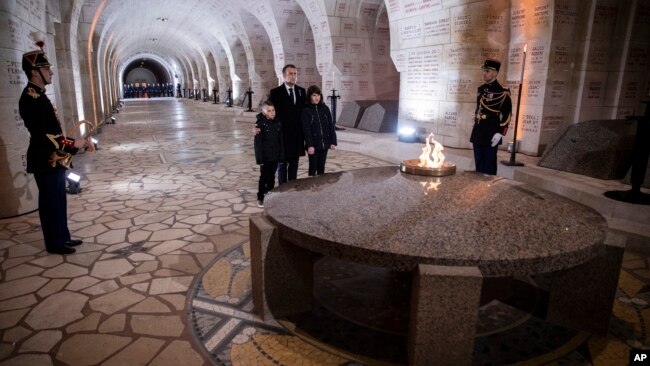U.S. President Donald Trump meets with French President Emmanuel Macron at the Elysee Palace Saturday to discuss European and Mideast security, reports VOA News.
The U.S. leader has traveled to Europe with first lady Melania Trump to participate in a ceremony Sunday to mark the 100th anniversary of the armistice that ended World War I, in which 40 million people were killed. The ceremony will be at the Arc de Triomphe and will be attended by dozens of world leaders.
Controversy seems to follow the U.S. leader, however, and a fresh one had erupted as Air Force One touched down at Orly Airport Friday.
Trump blasted a message for his host, terming Macron’s call for a European military “very insulting.”
In the touchdown tweet, Trump suggested Europe first pay “its fair share” of NATO before contemplating a Europewide force.
President Macron of France has just suggested that Europe build its own military in order to protect itself from the U.S., China and Russia. Very insulting, but perhaps Europe should first pay its fair share of NATO, which the U.S. subsidizes greatly!
— Donald J. Trump (@realDonaldTrump) November 9, 2018
As he stepped off his plane in Paris, a group of White House reporters shouted questions at him about the Twitter message. Trump stared at the journalists, but did not respond before entering the presidential limousine.
Hot and cold relationship
The fresh dispute between the two leaders, who have had a hot and cold relationship, threatens to cast a pall on Sunday’s ceremony.
The United States and France were allies in both world wars and partners in the post-World War II security structure for Western Europe: The North Atlantic Treaty Organization, which is composed of separate forces of varying strengths and capabilities of the member nations.
Trump, however, since taking office nearly two years ago, has repeatedly questioned the mutual defense pact and harshly criticized European countries for failing to meet pledges of spending 2 percent of their gross domestic product on defense. He has also emphasized that the United States needs to take care of itself first, before the needs of other nations, rejecting the concept of globalism.
Macron, during a visit to the World War I Western Front at Verdun, told Europe 1 radio that in face of a revived threat from Moscow that Europe needed to “defend itself better alone” and Europeans cannot protect themselves without a “true European army.”
Macron, in the interview, also blasted Trump’s recent announcement that Washington will withdraw from the 1987 Intermediate-Range Nuclear Forces Treaty (INF Treaty) limiting nuclear weapons that U.S. President Ronald Reagan and the Soviet General Secretary Mikhail Gorbachev agreed to.
The “main victim” of the withdrawal, Macron argued, is “Europe and its security.”
The French president added Europe also has to protect itself “with respect to China, Russia and even the United States of America.”
European army
Nine defense ministers from European countries are discussing how such a new international force would operate.
European leaders have perceived Trump’s demands for billions of additional dollars in defense spending from them as a threat for the United States to pull out of the nearly 70-year-old alliance.
But the idea of a European army has limited support in Berlin and London. Political and defense analysts question whether European countries have the will, money or military materiel to replace the raw power of the United States.
The issue comes into sharp focus as leaders commemorate the fallen of a century ago in the war that ended on the 11th hour of the 11th day of the 11th month.

